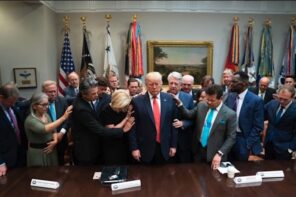Michael Wilkerson’s story here at RD about Lou Engle’s The Call revival in Uganda has prompted the controversial evangelist to issue a statement, purportedly disavowing the rally’s support of the country’s Anti-Homosexuality Bill. But serious questions have been raised about whether Engle is saying one thing to the American press, and another to Ugandan supporters of the bill.
As Wilkerson reported, before the event Engle claimed to have no knowledge of the bill, but once there, he was flanked by Ugandan speakers who clearly supported it.
According to the Christian Post (h/t Bartholomew’s Notes on Religion), last week Engle issued a statement claiming he didn’t promote the bill: “I apologize that this took place and that my stated purpose of not promoting the Bill was compromised. I take responsibility for what was done on the stage of TheCall, even in my absence.” He also claimed that he met with unspecified Christian leaders in Uganda and “that not” one “was carrying even an ounce of hatred for homosexuals.”
Not one ounce? James Nsaba Buturo, Uganda’s Minister for Ethics and Integrity, was a speaker at Engle’s rally, where Wilkerson reported Buturo called homosexuality “an abomination.” Julius Oyet, a self-styled “apostle” with Life Line Ministries in Uganda also spoke there, and, according to Wilkerson’s report, “brought up the common Ugandan perception that homosexuality is an import of the West which ‘recruits’ new members primarily by bribing children.”
What’s more, Jeff Sharlet, guest-posting on Warren Throckmorton’s blog, writes that both Oyet and David Bahati, the parliamentarian who authored the bill, told him that they met with Engle and he told them he supported the bill:
1. Both Oyet and Bahati were ecstatic at what they perceived as Engle’s strong support of the bill. They felt his rally and his statements would be a turning point for the bill, reassuring their Ugandan allies that they had support abroad.
2. Both Oyet and Bahati told me that Engle had explicitly expressed his support for the bill, telling them that he had to lie to the Western media because gays control it. They said he said one thing to the BBC and then walked over to Bahati and said that he really supported the bill. Either Engle isn’t telling the whole truth, or Oyet and Bahati aren’t. I tend to believe Bahati here, since Engle didn’t mean anything to him until he met him that day. He hadn’t heard of him and decided to attend the rally only after I’d told him a few things about Engle. In other words, he left the rally thrilled with Engle based on that encounter with Engle alone. Clearly, Engle did something to please him.
3. I spoke with Engle briefly–also recorded–and he said the following: “To this nation the pastors, the leaders, they’ve said they don’t want that agenda but it’s coming in, getting pushed by NGOs, UN, Unicef and other organizations so we’re just trying to take a stand to encourage them in their stand.” That certainly sounds like he’s supporting the bill, which is the only Ugandan stand to which he could be referring.
4. Engle says in his statement last week that Christian leaders in Uganda are working to soften the punishments. But both Oyet and Bahati, at least, strongly support the death penalty. For Bahati, author of the bill, that goes without saying. It’s worth noting that Oyet is now formally working for Bahati – according to Oyet and Bahati, Bahati used his [Parliament] office to empower Oyet to gather signatures in support of the bill AS a government official.
What Engle said to Sharlet is similar to what he said in his written statement, after claiming that the bill’s supporters actually wanted to lessen its penalties: “However, they were committed to raise up a principled stand to protect their people and their children from an unwelcome intrusion of homosexual ideology into an 83% Christian nation, an intrusion that is being pressed upon them by the UN, UNICEF, and other NGOs and Western colonialist powers.”
As Throckmorton notes in a post-script to Sharlet’s post:
I cannot know what the truth is but I would like Mr. Engle to speak clearly on this topic. Are Bahati and Oyet mistaken? Did they mislead Sharlet? Does Engle support the AHB? Does he support it with lesser penalties? Does he support the criminalization of homosexuality in Uganda? In the USA? Given Engle’s recent rise to prominence among religiously conservative political figures, these questions have important implications for American politics and policy.
Indeed (and I’ve requested comment from Engle’s organization). Engle has been evolving as an increasingly important figure to the religious right for rallying shock troops against what Engle calls “Antichrist legislation” (anything supportive of LGBT rights), against the “spirit of Herod” (health care reform) and in mobilizing younger and minority evangelicals in support of the movement’s agenda.
One of Engle’s patrons, the Family Research Council, lobbied against a House resolution condemning the Uganda measure. After that was reported, the organization claimed it did not support the Uganda bill, and only was attempting to make the portrayal of it “more factually accurate” in the House resolution and “to remove sweeping and inaccurate assertions that homosexual conduct is internationally recognized as a fundamental human right.”




